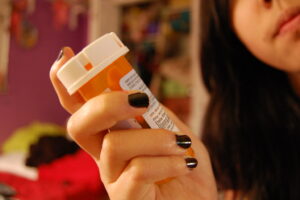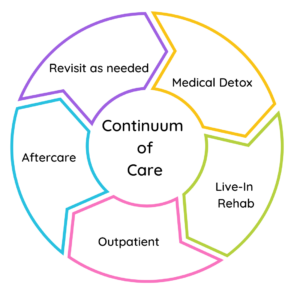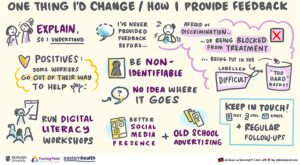Chapter 10: Treatment
By the end of this chapter, you should be able to:
- Identify and summarize the addiction process and the characteristics thereof. (LO3)
- Outline and critique current intervention and treatment modalities used in the field. (LO5)
Principles and Goals of Treatment

Treatment is a complex and challenging component of recovery. The National Institute of Drug Abuse (2018) lists this principles for effect treatment of drug addiction:
- Addiction is a complicated, but treatable disease; it affects an individual’s brain and behavior. There is a possibility that the changes will continue to affect the person long after ceasing to be actively addicted.
- There is not one way to treat addiction. Treatment varies greatly by person, by drug, by needs. So, proper treatment needs to adapt to the individual. It is also possible that there will be dual diagnoses, so care an attention should be given to those scenarios as well.
- Treatment needs to be available. Treatment is not going to happen if the users cannot access it. It should be accessible to those who need it, because it is more likely the individual will have a positive outcome.
- Treatment needs to be tailored. Effective treatment needs to attend to all of the needs of the person, not just the substance abuse. Inclusive practices will better serve the individual. Moreover, this should be adapted and re-evaluated over time, because the individual will change over time.
- Treatment needs to be completed or at least mostly completed. Research suggests that at least three months is needed for a reduction in addictive behaviors, but this will be different for everyone. Strategies should be used that engage the patient and prevent relapse. It is important to note that treatment does not have to be voluntary to be effective; there may be a greater buy-in to treatment if it is voluntary, but there are proven cases where mandatory treatment is successful.
- Treatment should include behavioral therapies. There are many options in this category, to meet the needs of the user, but research has shown that this form of therapy is beneficial.

“Addiction.” by kphotographer is licensed under CC BY-ND 2.0. - Medications may play a vital role. When combined with therapy, medications may play a pivotal role in the recovery process.
Selecting a Program and Beginning Treatment
Selecting the right program in order to begin treatment is an important step in addiction recovery. Review the hot spots below to learn more about how to select a program (Addiction Center, 2022; NIDA, 2018)
Treatment Continuuum

The first stage is medical detox. This is when the individual needs to experience some level of withdrawal in order to move on to treatment options. The detox protocols will vary from one person to another, one addiction to another (Oxford Treatment Center, 2022). Those experiencing withdrawal may be safer and more comfortable if completed within a program that is experienced with detoxification.
The next stage may be inpatient hospitalization and rehabilitation, which is where the highest level of care care be given to those who need it. It is important to note that this may not be feasible for all individuals. There are options of partial hospitalization programs and intensive outpatient programs, where someone can be in the program but stay in their homes (The Recovery Village, 2022).
Third is outpatient recovery, which generally consists of therapy sessions of varying length over a period of time. And now, with the influence of the COVID-19 pandemic, this can include virtual options (The Recovery Village, 2022). This also includes a plan for the individual to implement sober living, like how to cope with cravings, managing triggers, and discovering new ways to cope with stress, family, work, and friends (St. Joseph Institute for Addiction, 2018).
The final stage is aftercare and post-treatment support. Treatment may be complete, but there is still a phase of recovery maintenance. The individual has to continue to implement the plan developed for them and execute the coping strategies (Oxford Treatment Center, 2022).
Revisit as needed the different stages, if there is relapse or obstacles in someone’s recovery. In some ways, individuals who have experienced addiction may never be free of it, because they will always be fighting triggers and using coping methods. But, it may be more extreme, like relapse. In those cases, the individual may have to start over with detoxification.
Individual vs. Group Therapy
Individual therapy is also known as individual psychotherapy or counseling. In this situation the person meets with a counselor one to one, usually for an hour. The frequency of these meetings will depend entirely on the situation. The sessions will provide an opportunity for individuals to share their experiences, feelings, thoughts, goals, and so on. The counselor will help them develop a plan to achieve goals (Lumen Learning).
Group therapy is when the counselor meets with several clients with related problems. Group therapy has some limitations, because not everyone will want to share their experiences. Or there may be personality conflicts. But the benefit is a supportive group who understands the struggle in a way that others will not and it is a safe space to confront problems (Lumen Learning).
Which type of therapy is beneficial will depend entirely on the person, it may also be beneficial to have a combination of group and individual therapy. An honest, thoughtful look at the needs of the individual will guide this decision making process.
Treatment and the Family
Learn more about the family, their influence on someone’s recovery, and family therapy by watching the following videos.
Obstacles
Obstacles are a common issue with recovery and treatment of addictions. It will take commitment to overcome these items, but it is possible! (Duffy & Baldwin, 2013; Best et al., 2021; Rizzo et al., 2022)
- Lack of funds to pay for treatment
- Lack of access to treatment
- Lack of support network
- Untreated other issues
- Family and work challenges
- Lack of education
- Embarrassment or other emotional barriers
Below is a graphic of feedback provided by patients on their experience in treatment and their barriers to treatment (Rizzo et al., 2022)

References
Addiction Center (2022). Steps to help you choose the right rehab. Questions about Rehab. Retrieved on August 10, 2022 from https://www.addictioncenter.com/rehab-questions/choose-right-rehab/
Duffy, P. & Baldwin, H. (2013). Recovery post treatment: plans, barriers, and motivators. Substance Abuse Treatment, Prevention, and Policy, 8(6). https://substanceabusepolicy.biomedcentral.com/articles/10.1186/1747-597X-8-6#Sec12
Lumen Learning (n.d.). Introduction to psychology. Retrieved on August 10, 2022 from https://courses.lumenlearning.com/waymaker-psychology/
National Institute on Drug Abuse (2018). Types of treatment programs. Principles of Drug Addiction Treatment: A Research Based Guide. Retrieved on August 10, 2022 from https://nida.nih.gov/publications/principles-drug-addiction-treatment-research-based-guide-third-edition/drug-addiction-treatment-in-united-states/types-treatment-programs
National Institute on Drug Abuse (2018). Principles of effective treatment. Principles of Drug Addiction Treatment: A Research Based Guide. Retrieved on August 9, 2022 from https://nida.nih.gov/publications/principles-drug-addiction-treatment-research-based-guide-third-edition/principles-effective-treatment
Oxford Treatment Center (2022). Addiction treatment. American Addiction Centers. Retrieved on August 10, 2022 from https://oxfordtreatment.com/addiction-treatment/
Psych Hub (2020, October 1). What is family therapy? [Video]. YouTube. https://www.youtube.com/watch?v=nRTYg5n5Bq0
Recovery Village, The (2022). The importance of a continuum of care in addiction recovery. Continuum of Care in Addiction Recovery. Retrieved on August 10, 2022 from https://www.therecoveryvillage.com/treatment-program/why-continuum-of-care-is-important-in-recovery/
Rizzo, D., Mu, T., Cotroneo, S., & Arunogiri, S. (2022). Barriers to accessing addiction treatment for women at risk of homelessness. Frontiers in Global Women’s Health, 3, https://www.frontiersin.org/articles/10.3389/fgwh.2022.795532/full
Rogers Behavioral Health (2020, September 30). Hear the role family therapy plays in aloved one’s treatment at Rogers Behavioral Health [Video]. YouTube. https://www.youtube.com/watch?v=7t3bt8SC71I
SAMHSA (2012, April 9). Families in recovery (Part 1): Explaining addiction [Video]. YouTube. https://www.youtube.com/watch?v=sdt2U_avc40
SAMHSA (2006). Substance abuse: Clinical issues in intensive outpatient treatment. Treatment Improvement Protocol, 47. https://www.ncbi.nlm.nih.gov/books/NBK64088/
Sandstone Care (2022, February 10). What is the continuum of care program [Video]. YouTube. https://www.youtube.com/watch?v=A8fQLAypch8
St. Joseph Institute (2018). Understanding the continuum of care in addiction treatment. Retrieved on August 10, 2022 from https://stjosephinstitute.com/understanding-the-continuum-of-care-in-addiction-treatment/

